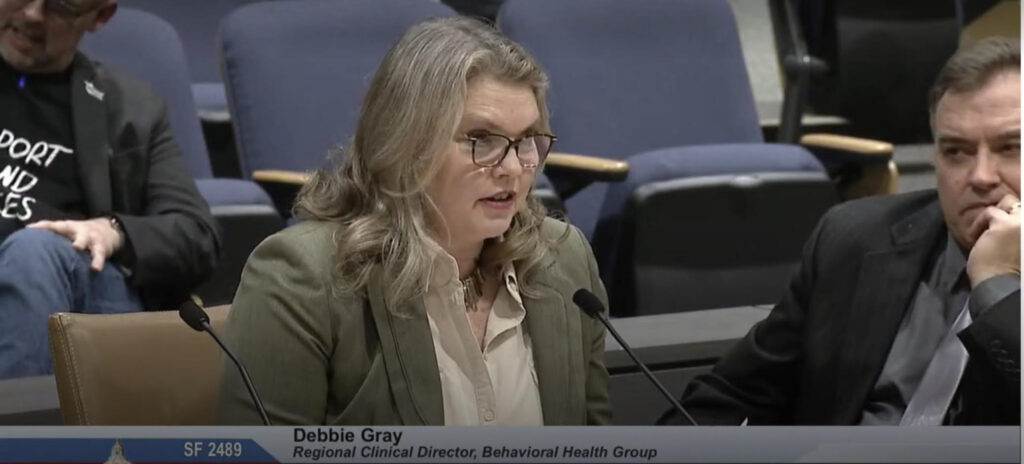“Mr. Chair and members of the Committee, my name is Debbie Gray.”

In March of this year, Debbie Gray, MSW, LICSW, LADC, Regional Clinical Director for Minnesota, Northern Missouri, Kansas, Iowa, and Idaho, introduced herself and launched her testimony to the Minnesota House Human Service Committee, addressing bill HF 2551 on behalf of BHG. She also testified at the Minnesota Senate Human Service Committee on bill SF 2489. These bills address improving access to opioid treatment in Minnesota and advocate for BHG counselors to touch more lives in that state. This incredible opportunity — televised on C-SPAN – allowed a member of BHG clinical leadership to call for improved quality of care for communities of greatest need. It also demonstrated collaborative bipartisan work with Representative Dave Baker (R) and Senator John Hoffman (D). Debbie championed the BHG mission as she spoke about the individualized treatment needs by our patients, and how our patients’ real recovery requires a fully integrated care program, not just a pill. She shared examples of patients who need our treatment as an element of safety for their lives, their families’ lives, and for the safety of the overall community they live in.
As the highest credentialed BHG employee in the state of Minnesota, Debbie stood as a powerful example of what’s possible with BHG’s inclusive leadership culture, especially coming as it did during Women’s History Month.
Script for Senator Hoffman
SF2489
No Amendments
Bill should be laid over for possible inclusion
DHS Licensing apparently has concerns, but haven’t told us what they are. THEY DID NOT TESTIFY IN THE HOUSE.
Senate Human Services Committee
3:00 PM March 8, 2023
Minnesota Senate Building, Room 1200
Mr. Chair and Members of the Committee:
SF2489 is legislation that will help improve the access to needed opioid treatment by freeing up counselors to provide more direct patient care while maintaining access to high quality care for those seeking opioid treatment.
The bill includes two changes.
The first change modifies when treatment plan reviews must take place.
Under current law, treatment plans must be reviewed every week for the first ten weeks of treatment, and then at least monthly unless the clinical need warrants a more frequent review.
The proposal would change the monthly review requirement to at least every three months unless the clinical needs warrants a more frequent review.
The second change modifies the maximum clients that a supervisor can supervise.
Current law states that a supervisor must not supervise more than 50 clients.
The proposal requires that a “counselor in an opioid treatment program must supervise clients at a level sufficient to ensure that patients have reasonable and prompt access to the counselor and receive counseling services at the required frequency and intensity, but that the counselor must not supervise more than 75 clients.
I authored this legislation because I am interested in making regulatory changes that will increase access to life-saving opioid treatments while maintaining counseling services at the frequency and intensity to successfully service clients.
Joining me is Debbie Gray, the Regional Clinical Director for Minnesota for Behavioral Health Group to explain how these changes will improve access to opioid treatment in Minnesota while maintaining a high level of counseling services that we all expect from our Opioid Treatment Program providers.
Debbie’s Testimony
Mr. Chair and members of the Committee:
My name is Debbie Gray. I am a Regional Clinical Director in Minnesota at Behavioral Health Group. I am a licensed independent clinical social worker and a licensed alcohol & drug counselor. Behavioral Health Group has 4 opioid treatment programs in the state: Brainerd, Brooklyn Park, Minneapolis, & Woodbury.
Thank you for this opportunity to speak in favor of HF 2551. HF2551 is about saving lives and will have an immediate impact by allowing greater access to opioid treatment and will support counselors in focusing on the urgent needs of client care.
Our communities are being affected and lives are being lost at an alarming rate because of the opioid crisis we are facing in our communities. In the last year there has been a flood of illicit opiate use in Minnesota. A 400% increase in illicit fentanyl positivity from 2019 in Minnesota was reported this past fall by Millennium Health based on their analysis of urine samples from substance use disorder treatment testing in the first half of 2022. Even more shocking was that in St. Louis County there has been a 25,000% increase in fentanyl positivity over the same time.
At the same time as the alarming increase, the addiction treatment field, like other fields, is facing a workforce crisis. In a pre-COVID report from the Department of Employment & Economic Development, there was a projected need for 360 additional LADC counselors in MN annually from 2016 – 2026. More recent information shared by MN DHS shows that as needs for LADCs continues to increase, more are leaving the field. This is compounding the crisis.
As Representative Baker stated, HF 2551 makes two changes. The bill lessens the frequency of state required paperwork and increases the cap on the number of patients a counselor can supervise.
I have worked in other states that have very little oversight. Oversight and regulations are good as they provide needed guard rails to good clinical care. The proposed changes allow for needed oversight but are more in line with the federal regulations that SAMSHA and Joint Commission outline for Opiate Treatment Programs.
Opioid involved overdose deaths among Minnesotans increased 44% from 2020 to 2021. The need for people to get help with opiate disorders is growing quickly. It is crucial that we make it easier for those in need to access care quickly. HF2551 proposes to change the caseload size of a counselor in an Opioid Treatment Program from 50 to 75.
The guidelines for OTP providers include many provisions that protect patients and impact patient care, where, in my opinion, ratios or caps do not. The ratios do not recognize that each patient has individual needs, some have lower needs and some more intense. For some counselors a 50-patient ratio or lower makes sense especially if their caseload consists of new or unstable patients. However, as patients are stabilized, their needs decrease, and the patient cap can be higher. Rather than relying on ratios, the bill includes new language that comes from the federal guidelines that counselors “must supervise clients at a level sufficient to ensure that patients have reasonable and prompt access to the counselor and receive counseling services at the required frequency and intensity.” In addition, the legislation retains the ratio cap, but moves it to 75. A ratio cap is not included in the federal guidelines. However, the federal guidelines do advise that “States allow for an increase in the ratio under certain circumstances”.
Currently when counselors’ caseloads are full in an Opioid Treatment Program, they are required to stop taking new patients until there is an opening. Over the past year, every Minnesota Opioid Treatment Program has had to close their admissions for new patients at least once. This situation makes it harder for people in crisis to access care and to address the opioid crisis. With the bill’s proposed change, there will be an immediate impact as more space and opportunities for people to get into needed treatment will open.
The second change would change the frequency of a treatment plan review for stable patients from every month to every three months. MN DHS published a 2018 Workforce Survey that showed that a large number of people are leaving the profession due to dissatisfaction or burnout. The survey identified the top reason for burnout was paperwork and documentation that caused the job to be too stressful. The demand for LADCs is increasing, but the dissatisfaction regarding paperwork requirements is influencing many to leave the profession.
The importance of this proposed change is to free up clinical staff to spend more time assessing the current needs of patients. Programs will continue to provide evidence-based quality care, but with this change they can invest more resources directly with patients. This change is consistent with federal guidelines which refer to quarterly reviews.
I ask that you pass HF 2551, as the changes included in the bill will have an immediate impact by increasing access to needed care and saving lives. Thank you for your time and I would be happy to answer any questions you may have.

Samson Teklemariam
Vice President, Director of Clinical Services
